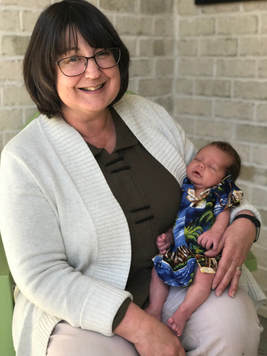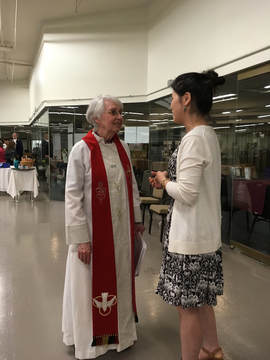 Since 2018 began, I’ve been thrice to Massachusetts (Cabinet and Board of Ordained Ministry), once in New Hampshire (Cabinet appointment retreat), I’ve been once to Hawaii (family reunion), twice to Florida (mission trip and GBHEM training), and a stopover in North Carolina to meet our new Grandson. Whew, how lovely to settle back into Maine with spring sunshine and birdsong in the air. (We won’t talk about the spring skunk scent). In every communal aspect of our UMC network, from global to local, I enter thoughtful encounter with scripture, real and humble reflection on Christian living, and radical hospitality. My greatest hope is that my children and grandchildren will find, and help create, this kind of community. It’s easy for me to forget that not everyone lives life this way until I’m out of the network for a while and live in what feels like thinner air. (It’s also a joy when I encounter God’s grace in other ways and places that are not traditionally “Christian.”) And I find it increasingly difficult to participate in social media conversations that easily loose the listening quality and hospitality toward others that I find at “in person” gatherings. How might each of us infuse our shared virtual spaces with means of grace? My recent immersions in missional and healing communities have been all the more sacred for bible study before and during them. I’m so grateful for our 2017 Church Conference conversations that were shaped by the very first post-Pentecost Christ-following community’s experience. The believers devoted themselves to the apostles’ teaching, to the community, to their shared meals, and to their prayers. A sense of awe came over everyone. God performed many wonders and signs through the apostles. All the believers were united and shared everything. They would sell pieces of property and possessions and distribute the proceeds to everyone who needed them. Every day, they met together in the temple and ate in their homes. They shared food with gladness and simplicity. They praised God and demonstrated God’s goodness to everyone. - Acts 2: 42-26. CEB During a colleague’s February hospitalization, I heard amazed staff ask, “Who are you all?” They were amazed at community that cared enough to take turns keeping her company. During January’s MidMaine Volunteers in Mission to Florida, our clients said again and again that they couldn’t believe people would give up their own work and vacation time to spend a week helping people they didn’t even know. Why would we do that? It WAS amazing, community created in the space of a week, from communities across Maine, who lived, worked and worshiped together in Christ centered deepening. I Early Christians’ simple daily practices were reclaimed and reformed for a new day by the Wesley brothers, John and Charles, and other early Methodists as “means of grace:” prayer, searching the scriptures, the Lord’s Supper, fasting, and christian conferencing. Elaine A Heath leads contemporary United Methodists through renewed practice of these every day blessings in “Five Means of Grace: Experience God’s Love the Wesleyan Way.” “In the book that set the trajectory for her intellectual and ecclesial work, The Mystic Way of Evangelism, Heath argues that evangelism is best practiced in the context of Christian communities gathered together around a Wesleyan rule of life for the sake of their neighbors…..To put these ideas into practice, Heath and some of her students in 2008 founded the first two communities that led to the formation of the Missional Wisdom Foundation in 2010. The Foundation fosters evangelistic communities that bring together Wesleyan spirituality and new monastic practices to work for the renewal of historically mainline denominations [with four hubs that] serve as educational immersion sites for students and congregations that want to learn how to take the gospel beyond the walls of the church.” (http://aftesite.org/elaine-heath/) These new faith communities are experiments in radical Christian living, in the Acts 2 style. Scripture comes alive. Encountering the living Christ then transforms people’s daily living in ways that overflow into surrounding communities with delight and hope. People are amazed by and drawn to what the Spirit is doing. The Lord added daily to the community those who were being saved. –Acts 2: 27. CEB What is your experience NOW of Christian community? Is there an element of wonder? Of openness to each other’s needs? Of being led by the living Christ’s vision? If it’s not as alive as what you’re reading about here, try incorporating the Means of Grace with authenticity this Lent. You might try it in your family, with a group of friends, or in your church. It could be something as simple as a weekly shared meal, discussion of one of Heath’s chapters from “Five Means of Grace,” and a shared promise to try practicing one of the means of grace each week, then regathering to share how it went. Christ is alive and desires life your you and for your community.
1 Comment
 Listening is a powerful human experience. During a colleague’s recent hospitalization, I became newly aware of the difference between a doctor who acts on their own assumptions and one who listens to the patient’s experience. This difference can be annoying. Or it can be the difference between life and death. And it seems to parallel an essential aspect of Lent. Is the purpose of these set aside days between Ash Wednesday and Easter to demonstrate what we think we know God wants, or is it to set aside our accumulated assumptions, no matter how well intentioned, so that we can listen with fresh ears to what God is trying to communicate to us here and now? The prophet Isaiah observes from a God’s eye view that “day after day [God’s people] seek me and delight to know my ways, as if they were a nation that practiced righteousness and did not forsake the ordinance of their God; they ask of me righteous judgments, they delight to draw near to God…” Isaiah 58: 2 God’s experience of humanity makes me deeply uncomfortable. Perhaps I can make up for it by buckling down on my spiritual practices, upping my game. And God responds, in the prophet’s words, “look, you serve your own interest on your fast day, and oppress all your workers. Look, you fast only to quarrel and to fight and to strike with a wicked fist. Such fasting as you do today will not make your voice heard on high. Is such the fast that I choose, a day to humble oneself? Is it to bow down the head like a bulrush and to lie in sackcloth and ashes? Will you call this a fast day, a day acceptable to the LORD? Isaiah 58: 3-5 In other words, is Lent about me and my Godward assumptions? Over centuries of practice, Lent has become a season where many of us attempt to prove our spiritual worth to God (and each other). I am able to…. give up chocolate…. cuss less…. pray more often….dedicate my reading to a spiritual classic or thought provoking new inspiration. None of these are bad. Some are very good. But they’re not at the heart of Lent where God yearns to find space within us for authentic encounter. Lent is meant to be a self-emptying opportunity, when I draw near to God in a process that may burn and pull, seeking to dislodge obstacles, excessiveness, the unholy from my life before a truer, purer delight can be born. I find the prophets words deeply challenging when God’s choices and their actual implications for me are made explicit. Is not this the fast that I choose: to loose the bonds of injustice, to undo the thongs of the yoke, to let the oppressed go free, and to break every yoke? Is it not to share your bread with the hungry, and bring the homeless poor into your house; when you see the naked, to cover them, and not to hide yourself from your own kin? Isaiah 58: 6-7 These are not metaphorical musings. These are evidence of the real desire of God’s heart to build beloved community. These make demands of me, not just my money or my ideas (my, my, my) but how I will spend the days God gives me and with whom. They are the prescription of our Holy Healer. If you remove the yoke from among you, the pointing of the finger, the speaking of evil, if you offer your food to the hungry and satisfy the needs of the afflicted, then your light shall rise in the darkness and your gloom be like the noonday. Isaiah 58: 8-10 This Lent I will be using the little pocket book, ‘Five Means of Grace: Experience of God’s Love in the Wesleyan Way,” by Elaine A. Heath, as my guide. Not to prove anything to myself or anyone else, but to help me listen to the still small voice that promises: The LORD will guide you continually, and satisfy your needs in parched places, and make your bones strong; and you shall be like a watered garden, like a spring of water, whose waters never fail. Your ancient ruins shall be rebuilt; you shall raise up the foundations of many generations; you shall be called the repairer of the breach, the restorer of streets to live in. Isaiah 58: 11-12 |
Karen L MunsonA pastor and artist, I'm wondering while I'm wandering through God's marvelous creation. Archives
March 2020
Categories |
 RSS Feed
RSS Feed